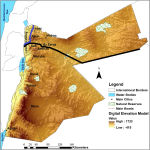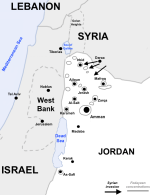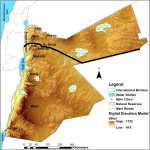Genuinely I think this goes one of two ways:
1. Damascus and Baghdad talk the PLO into agreeing to 'officially' recognise the civil authority of Jordan over the area while remaining operational there. Hussein is caught on a tight balancing act and may end up recognising the independence of Palestine/dropping claims to the West Bank earlier.
2. The PLO declare themselves the legitimate government of a Palestine that spans both sides of the Jordan, backed by Iraq and Syria- potentially Egypt as well. Hussein reacts to this by accusing the Arab League of betrayal and offers to recognise the independence of Israel immediately in return for getting the West Bank back, maybe joint custody over the Old City and basing rights.
If Israel accepts this and get their troops in position to prevent a larger Syrian-Iraqi intervention we probably see a two stage evolution where initially Hussein is seen as the greatest betrayer of the Arab people by other governments; but if it lasts longer enough 'which government do you back' becomes the big political faultine of the area.
...
Hussein's abandonment of the West Bank had in part to do with a belief after the First Intifada that he wasn't wanted. He also did this in order to nudge the Israelis toward having to deal with the PLO. I don't think either is applicable in this circumstance.
The tight balancing act seems plausible to me. Hussein would be boxed in by the Arab States and prevented from getting too cozy with Israel/America. Meanwhile Hussein OTL tried to make agreements with Arafat in the 80s despite Arafat trying to kill him four or five times and killing his Prime Minister.
Syria also doesn't want to let Arafat be too independent. They intervened in Lebanon's Civil War to prevent a PLO takeover of Lebanon after all, before switching to champion the Palestinian cause after Sadat made peace with Israel.
Things could get weird in the Yom Kippur War. With Arafat's desire to jump into the conflict and the prospect of Syrian and Iraqi troops attacking into the Jordan Valley, Israel would be spread thinner. But Syria and Arafat would have to keep an eye on Hussein. On the other hand, Hussein attacking PLO-Jordan during the War against Israel would look bad.
Maybe Jordan would be more involved with Egypt's peace efforts. A good way to boost Hussein's prestige would be to end Israeli occupation of much of the West Bank. A problem OTL was that Israel didn't want to return territory without security guarantees, whereas Jordan said peace and returning territory
was the basis for a security guarantee. Israel suggested the Allon Plan (but didn't even commit to it...) which Hussein thought was a joke of an idea, and the Israelis themselves couldn't really come up with what they wanted. Hussein's maximum territorial cessions in 1967-1970 that he was willing to go for were minor border adjustments like the no man's lands and reunification of previously divided villages under Israeli control.
Also, there is another aspect to this that I forgot to consider: Israel would likely move into the Gilead Heights (the "Jordanian Golan") if the PLO took control of the North of Jordan.







